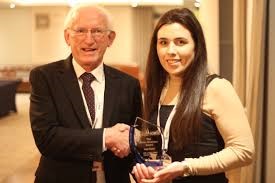Sheep Ireland are holding the inaugural ICBF and Sheep Ireland Genetics Conference in the Heritage Hotel, Killenard, Co. Laois at 9.30 am, on Friday 17th of January 2020. Last year the winner of best poster received the ‘Brian Wickham award’ as well as a travel bursary. This year the winner of ‘2019 Best Poster award’ will also receive a travel bursary, with plenty of posters entered, there is sure to be stiff competition.
Below is a detailed account from last years winner, Nicola Fetherstone, who used her prize of a travel bursary to go to New Zealand. Nicola illustrates how the travel bursary was put to good use, being used to further a students opportunities to travel, network and communicate results that were due to a collaboration from Sheep Ireland.
I commenced by PhD in conjunction with Teagasc Athenry and University College Dublin on the across country comparison of Irish versus New Zealand genetics. Hailing from Stonepark, Co.Roscommon, I had an interest in agriculture from an early age, going on to pursue an Agricultural Science degree (Animal Science) with University College Dublin in 2013. On completion of the four year degree, an opportunity arose to join an exciting and novel sheep research programme in Athenry under the supervison of Dr. Noirin McHugh, Dr. Fiona McGovern and Assoc. Prof. Tommy Boland. As someone who always enjoyed being involved with my parents and grandparents family farms, the idea of enhancing my knowledge through the balance of on-farm data collection and office based work really appealed to me.
As part of my PhD I will undertake the validation of Sheep Ireland €uro-Star Replacement Index, which is obviously a very important and interesting study for the Irish sheep industry. It’s very fulfilling knowing that our work could lead to an increase in the productivity of the national sheep industry. We record a huge amount of data across the entire production year, including reproductive and lambing traits, live-weights, body condition scores, ewe milk yields, ewe feed intakes, lamb faecal egg counts etc. and compare ewes selected based on High Replacement Indexes to ewes selected based on Low Replacement Indexes, a third group of New Zealand ewes sourced based on the Maternal Index in New Zealand are also included in the trial. Along with my supervisors, the dedicated team includes Henry Walsh, Tom Keane and many agricultural science students who join as part of their work placement. We are all very excited to see some final results demonstrating the importance and benefits of using high genetic merit animals, as phase one of the project comes to a close.
For me, one of the most satisfying aspects of doing the PhD is getting an opportunity to present the data that we have worked hard on gathering and analysing to others, for example, at open days and conferences. I think it’s important to demonstrate to farmers, students, researchers and other industry experts the importance of the work we are carrying out, the benefits of high genetic merit animals and perhaps discuss breeding strategies to implement in the future. In December 2018, the ICBF/Sheep Ireland conference proved a great opportunity to confirm to those that are investing in genetics that it is worthwhile. I submitted a poster that looked at how lamb performance and ewe milk yield are influenced by genetic merit. Results confirmed how ewes with a greater milk yield will produce heavier lambs at six weeks post-lambing and in turn reduce their days to slaughter by up to 15 days. I was delighted to be selected to receive the Brian Wickham “Best Poster” award and €1,000 travel bursary, while competing against many outstanding posters, in recognition of our hard work. Award in hand was an incredible way to leave what I believe was a very successful, thought-provoking and interactive conference, full of discussion and interesting research.
I then set my sights on presenting at the American Society of Animal Science conference in Austin, Texas the following July. I worked in collaboration with Sheep Ireland to analyse national data, accumulated through the recording of on-farm data by Irish farmers since the establishment of Sheep Ireland. The aim of my analysis was to look at what factors influence weight gain in lambs pre-weaning for six main pedigree breeds; Charollais, Texel, Suffolk, Belclare, Lleyn and Vendeen. Results showed that birth type impacts live-weight, regardless of rearing type, that hogget ewes produce heavier lambs than ewe lambs up until their 3rd lamb crop only and that ewe progeny live-weight peaks in third and fourth lactation, regardless of age at first lambing.
I was delighted to get the opportunity to present this work to an international audience and showcase the asset we have in a well-established national database, unlike many other countries. I also used the occasion to attend many presentations as well as network with other researchers; a great way to broaden my knowledge of other research institutes and projects all across the world, while also learning to appreciate further the extent of the resources available and the quality of the research carried out in Ireland. The importance of learning about other international research cannot be underestimated and on completing three months in world leading agri-scientific company; AbacusBio in New Zealand, through Teagasc’s International training programme, I’m very grateful to have the opportunity as part of my PhD to submit a scientific paper for publishing in collaboration with them on the potential genetic benefits of foreign sire contributions to a domestic sheep industry including a New Zealand-Ireland case study.
I’d like to take this opportunity to thank both ICBF and Sheep Ireland for their generosity, the judges for their deliberation and to wish them and all the other presenters the very best of luck for the next conference in January 2020.

